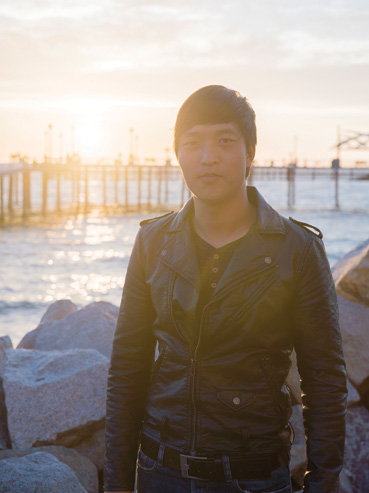The 25-year-old defector from North Korea adjusts to life as an American citizen, but hasn’t forgotten about his friends— or the sunsets—back home.
story by STEVE HAN
photograph by KYUSUNG GONG
When he watches the sun set over Los Angeles at the end of every day, Danny Lee reminisces about the happy days back home. He looks every bit the part of an average young Korean American in Southern California, down to the long bangs that hang over his eyes. But those happy days were few and far between in his native North Korea. Looking back on it now, though, with an ocean separating the 25-year-old from his homeland, he finds himself able to indulge in nostalgia.
“There are times when I miss it,” Lee said, in Korean, to KoreAm Journal over a late lunch at a Manhattan Beach pizzeria. “When I see the sun go down, it reminds me of the times back home when I was outside playing with my friends until it got dark.”
Lee is all smiles as he recalls his past in one of the world’s most secretive countries. “I’m free now, and sometimes, it’s almost human nature to look at past hardship as a distant memory,” he said.
Lee escaped with help from Liberty in North Korea, also known as LiNK, a nonprofit that oversees refugees’ escape and relocation. It may seem odd that Lee chose to come to the U.S. over South Korea. Of the tens of thousands of North Korean refugees living in northern China, barely more than a hundred have fled to the United States. It’s in the U.S., though, that Lee became something of a star. His dramatic life story has been recounted in a 30-minute documentary produced by LiNK, which ishosting screenings and workshops throughout the country.
The screenings have drawn “awesome” response from “insanely amazing people,” said Hyerim Ko, LiNK’s U.S. settlement coordinator. From 394 screenings across the country so far, LiNK raised over $60,000 from more than 23,000 people, which Ko says is enough money to rescue more than 20 refugees.
While the chance to adapt to a completely different lifestyle in the U.S. may have been attractive to Lee, he surely never imagined all of this.
Lee grew up in a village in Hwaeryong, located along the border that separates North Korea from China. Freedom wasn’t the only thing Lee didn’t have when he was growing up. The hunger was excruciating, he said, so much so that Lee’s mother risked her life to make several trips across the Chinese border to bring food for him and his grandmother. Had the North Korean or Chinese authorities caught her, she would have faced certain death at a concentration camp.
But when his mother went to China one day and didn’t return for five months, Lee decided that he, too, must escape to find her. Leaving his grandmother behind was heartbreaking for him, but he felt as if he had little choice. He could not even reveal to her that he was fleeing.
Lee paid a broker and crossed the border on March 15, 2005, by walking over the frozen Tumen River. The North Korean government tightened its border last year, replacing the border guards with the country’s special units. The effect is already showing. Korean TV news network YTN recently reported that only 1,400 North Korean defectors made it to South Korea in 2012, a significant decrease in comparison to 2,700 from 2011.
In China, Lee found his mother and stayed near Yanbian, a region inhabited by a large number of ethnic Koreans. He got a cleaning job at a restaurant, but lived with the constant fear of getting caught by Chinese police and being sent back to North Korea.
“In a way, living in China was worse,” Lee said. “I had to live in hiding for the entire time, and worked so many hours.”
Then, he found out from people who frequently trekked back and forth from North Korea that his grandmother was dead.
“Learning about my grandmother’s death … was the hardest thing to deal with,” Lee said. “She was the one who raised me. It still haunts me that I couldn’t tell her that I was leaving her, even as I was planning to escape.”
To this day, Lee doesn’t know the exact cause of her death, but he assumed that it was due to starvation. “I don’t know if there’s a grave of my grandmother, but I’m just hoping that some people were so kind as to do that for our family,” he said.
In China, Lee came across representatives of LiNK, which has overseen the escape and relocation of 154 North Korean refugees thus far.
“North Korean refugees realize that we are a non-political, non-religious organization,” said Sokeel Park, LiNK’s director of research and strategy. “We do not expect to be repaid for anything. They realize that we are motivated by humanitarian reasons, and that makes us easier to trust.”
Both Lee and his mother were supposed to be sent to the United States with LiNK’s help. The vast majority of North Koreans defect to South Korea, but some fear the discrimination they may face south of the 38th parallel, according to Ko. Moreover, some feel that South Korea is too close to North Korea, a place they would like to be as far away from as possible, for their own safety. All of this makes the U.S. a more appealing destination for some defectors, as they perceive the States to be a place that offers “more freedom or more opportunity than South Korea,” she said.
Lee, also, seems to have been fueled by a sense of adventure.
“I only get to live one time,” Lee said. “Escaping North Korea was a life-threatening risk I decided to take, and I figured I might as well take the biggest risk possible by choosing to come to the U.S. I knew coming here would give me the chance to learn a new language and culture. I also liked that I could live in a racially diverse environment.”
But before Lee and his mother could escape, she got caught by the Chinese police. After a long dispute between the Chinese authorities and the U.S. embassy in China, she was sent to South Korea instead.
Lee stuck with his plan to get to the U.S. In 2007, he settled in Salt Lake City, Utah, where he made ends meet by working at a hamburger restaurant and the storage room of a clothing store. There was still a difficult cultural adjustment to make as well.
“All of a sudden, I was free,” he said. “I had to consider myself a newborn baby growing up all over again. But this time around, in a capitalist society.” He added, pointing to his pizza, “I didn’t even know what this was before coming to America. I had to learn one thing at a time. I would’ve had a mental breakdown if I tried to process everything at once.”
Lee relocated to Los Angeles after a year because he thought a larger Korean population would make it easier for him to network, navigate U.S. society and find job opportunities. Last September, Lee became an American citizen, a status which North Korean refugees can apply for after five years of residency.
“Ideally, I want to bring my mother one day, once I’m completely settled here,” said Lee, who speaks with her on the phone regularly, and visits her in South Korea. “I just want to live a life where I can be with my family. And perhaps if an opportunity comes where I can help people in North Korea in some way, I’d be happy to help.”
The opportunity to help other North Koreans came last year when LiNK approached him with an unexpected request. One of LiNK’s missions is its SHIFT Campaign, through which it seeks to take the focus away from the geopolitical machinations and bizarre cultural kitsch of North Korea, and back to the lot of its people. The nonprofit produces documentaries as part of the campaign, and the organization approached Lee about being the subject of a short film about his life.
“There is never any pressure on any of the refugees we work with to engage on the issue or be outspoken,” Park said. “But in the cases where some of our North Korean refugee friends do want to share their experiences for the sake of other North Korean refugees or people still inside the country, we think it’s important to empower them with opportunities to make their voices heard, so that we can help bring more attention and understanding to the perspective of the North Korean people.”
Lee gladly accepted, as he believed it would help to shed light on the lives of average North Koreans. “It was never about me getting media exposure,” he said. “What average North Koreans want more than anything is for the rest of the world to warm towards them. I wanted this film to be a gateway for the audience here to sincerely sympathize with North Koreans. At the end of the day, that’s what North Koreans want, more than money or food. They just want to be understood.
“At first, it was weird for me to talk in front of the camera,” he said. “It felt awkward. But I realized that I had to look confident and assured, because I wanted to represent my people as those who are seeking freedom and happiness to overcome difficulties.”
Lee is present at some of the screenings to field questions, thrusting the young man into the role of spokesperson.
The most memorable screening so far was one that took place at Boston University, where Lee shared his personal story of his escape and brought many audience members to tears.
“After [the screening at BU], our team was flooded by people wanting to buy merchandise, find out more about our organization, and how to get involved through donations and internship opportunities,” Ko said. “This event was the example of how the power of great organization and collaboration can relay a message to people and really ignite them to act.”
Now, Lee balances his time between those activities and his personal goals: earning his GED, and becoming either a nurse or an accountant. And indulging in the occasional slice of pizza in Manhattan Beach with a reporter.
“I’m one of very few people who came here from North Korea,” Lee said. “I’m here having fun and living a happy life, but people over there are still living miserably. It makes me feel bad sometimes to be so happy. So I want to do whatever I can to help them.”
NUMBER OF NORTH KOREAN REFUGEES AROUND THE WORLD
South Korea: over 20,000
Germany: over 1,300
UK: over 600
USA: over 400
Canada: over 300
Japan: over 100
France: over 70
Holland: over 30
Belgium: over 30
Australia: over 20
These numbers do not include refugees who gained permanent residence of the respective countries and those counted as undocumented.
SOURCE: THE UN REFUGEE AGENCY
This article was published in the July 2013 issue of KoreAm. Subscribe today! To purchase a single issue copy of the July issue, click the “Buy Now” button below. (U.S. customers only. Expect delivery in 5-7 business days).








